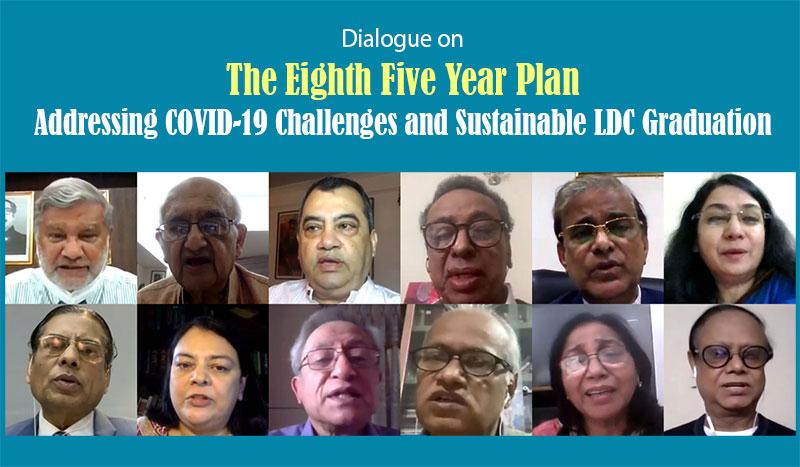
The Eighth Five Year Plan (8FYP) is being prepared at a crucial time for Bangladesh. It is expected that the 8FYP would lay out a smooth and resilient recovery path from the unanticipated impact of COVID-19, especially when Bangladesh is thriving to graduate from the LDC status. Hence, this is an opportune moment to reflect on the lessons learnt from the Seventh Five Year Plan (7FYP), review the attendant challenges in the present context, and put forward a set of recommendations.
At this crucial juncture, the Centre for Policy Dialogue (CPD) organised a virtual dialogue titled “The Eighth Five Year Plan: Addressing COVID-19 Challenges and Sustainable LDC Graduation” on Tuesday, 8 December 2020. The objective of the event was to put forward some recommendations in view of the experience of the 7FYP while taking into account the pandemic challenges and sustainable LDC graduation.
Dr Fahmida Khatun, Executive Director, CPD, presented the keynote paper. The presentation covered the following issues—1) Revenue mobilisation and public expenditure, 2) Employment-friendly investment and industrialisation, 3) Monetary policy and banking sector, 4) International trade, and 5) External finance for development.
Dr Fahmida emphasised the need for reforms and institutional strengthening for high domestic resource mobilisation and efficient public expenditure. She also highlighted the need for higher private investment and employment generation. The 8FYP has to spell out clearly how Bangladesh will prepare for a smooth and sustainable LDC graduation.
Mr M A Mannan, MP, Hon’ble Minister for Planning, Government of Bangladesh joined the Dialogue as the Chief Guest. He said that the 8FYP is open for comments and analysis from all levels given the current overall environment of the country is conducive for growth and progress.
Mr Saber Hossain Chowdhury, MP, Honorary President, Inter-Parliamentary Union (IPU), Member, Parliamentary Standing Committee on Ministry of Environment, Forest and Climate Change and Mr Amir Khosru Mahmud Chowdhury, Former Minister for Commerce and Chairman, Sarina Group were present at the Dialogue as Special Guests. Saber Hossain Chowdhury emphasised the need for alignment of the five-year plans and their reflection as well as implementation to make coordination among financing gaps, GDP growth, inequality, and health-related deficits. Mr Amir Khosru pointed out the importance of political inclusiveness and accountability for a sustainable economy.
Dr Shamsul Alam, Member (Senior Secretary), General Economics Division (GED), Planning Commission, the Guest of Honour at the event, remarked that the removal of the quota system has been the government’s success in the last five years. He mentioned that the government is expecting a rise in public investment rate. He mentioned that the 8FYP document will be available on the website for discussion. He encouraged everyone to provide their comments on the document.
Former World Bank lead economist Dr Zahid Hussain said that the pandemic has hit the economy hard and would have an impact on the LDC graduation as well. Consequently, relief from the pandemic is considered as one of the major challenges of the 8FYP. He emphasised on investing in public health and pharmaceutical interventions alongside the issues like the role of non-state actors (NSAs) in policy reforms, strengthening fiscal policies, increasing public as well as private investment, etc.
Barrister Nihad Kabir, President, Metropolitan Chamber of Commerce and Industry (MCCI) added that monitoring and evaluation is imperative for smooth implementation of the five-year plan. She laid emphasis on institutional strengthening and efficiency of public investment.
Dr Ahsan Habib Mansur, Executive Director, Policy Research Institute of Bangladesh (PRI) and Chairman, BRAC Bank also highlighted financing gap, strengthening of institutional capacities, and lack of policy implementation and reforms. He pointed out a number of crucial challenges that include employment, non-agricultural productivity, dependency on man-made fibre, stagnation in terms of per capita income growth, tax-GDP ratio, VAT reforms, small and medium enterprise (SME) sector, etc.
Ms Shaheen Anam, Executive Director of Manusher Jonno Foundation (MJF) called weak revenue collection as one of the challenges, and added that the loan defaulters need to be taken into accountability immediately.
Mr Razequzzaman Ratan, President, Socialist Labour Front, said that the government should ensure permanent jobs for those who were still out of the formal sector while emphasising the need for labour market assessment in view of 8FYP.
CPD Chairman Professor Rehman Sobhan chaired the event. Professor Sobhan said, a mid-term review needs to be re-introduced to evaluate five year plans. He also remarked that a scorecard is necessary to evaluate the progress and 8FYP has to be evaluated on the basis of the lessons from its predecessor. Given the informal sector as the most vulnerable during COVID-19 and disintegration of SMEs is a vital problem, he urged the policymakers to work on inclusive strategies for effective implementation of 8FYP.
Professor Mustafizur Rahman, Distinguished Fellow, CPD was the moderator. The virtual dialogue was participated by an esteemed group of high-level policymakers, experts, business leaders, civil society members, development partners and representatives of the media across Bangladesh, and beyond.

